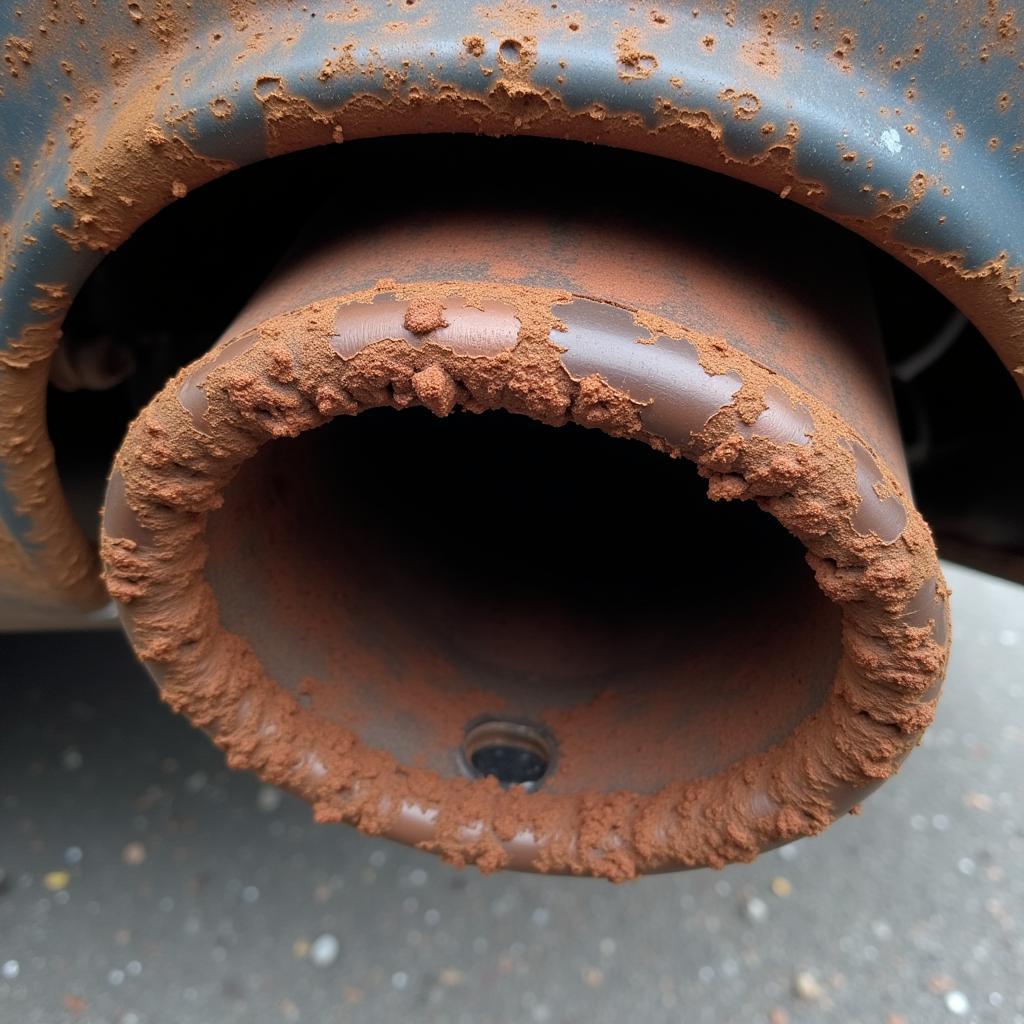Experiencing issues with your car’s exhaust system? You’re not alone. Car exhaust problems are a common headache for car owners, but deciphering the warning signs can be confusing. This guide will delve deep into the symptoms of car exhaust problems, equipping you with the knowledge to address them effectively.
What Does the Exhaust System Do?
Before we dive into the symptoms, it’s essential to understand the vital role your car’s exhaust system plays. This complex system is responsible for:
- Directing harmful exhaust fumes away from the vehicle’s cabin: This protects you and your passengers from dangerous gases like carbon monoxide.
- Reducing noise pollution: The muffler acts as a silencer, minimizing the noise produced by the engine.
- Improving fuel efficiency: A well-functioning exhaust system optimizes engine performance, leading to better fuel economy.
- Reducing harmful emissions: The catalytic converter in the system converts harmful pollutants into less harmful substances, minimizing your car’s environmental impact.
Common Car Exhaust Problems Symptoms
A malfunctioning exhaust system can manifest itself in several ways. Recognizing these signs early can save you from costly repairs and potential safety hazards down the line. Here are some common Car Exhaust Problems Symptoms to watch out for:
1. Unusual Noises
Loud roaring sounds: If your car sounds like a roaring beast, especially when accelerating, it might indicate a hole in the exhaust pipe or muffler.
Hissing or tapping noises: These subtle sounds, often heard when starting the engine or accelerating, could point towards a leak in the exhaust manifold or gasket.
Rattling sounds: A rattling noise from beneath the car might be due to a loose heat shield on the exhaust system or a broken exhaust hanger.
2. Changes in Exhaust Smoke
Excessive smoke: While some exhaust smoke is normal, excessive amounts of different colors can signal underlying issues:
* **Black smoke:** Usually indicates the engine is burning too much fuel, potentially due to a clogged air filter, faulty fuel injector, or a malfunctioning oxygen sensor.
* **Blue smoke:** A sign that the engine is burning oil, often caused by worn piston rings, valve seals, or a faulty PCV valve.
* **White smoke:** Could indicate a coolant leak into the combustion chamber, often caused by a blown head gasket, a cracked cylinder head, or a damaged engine block. Unusual smell: A rotten egg smell coming from the exhaust is a telltale sign of a catalytic converter issue. The converter isn’t properly converting harmful hydrogen sulfide gas, leading to this unpleasant odor.
3. Performance Issues
Decreased fuel efficiency: A leak in the exhaust system can disrupt the optimal air-fuel mixture needed for efficient combustion, leading to a noticeable drop in your car’s gas mileage.
Reduced engine power: A clogged catalytic converter or exhaust manifold can restrict exhaust flow, causing a decrease in engine power and sluggish acceleration.
Engine misfires or stalling: A severe exhaust leak, especially near the oxygen sensor, can disrupt the sensor’s readings, leading to an imbalanced air-fuel mixture and causing engine performance issues like misfires or stalling.
4. Physical Signs
Visible rust or damage: Regularly inspect your car’s exhaust system for signs of rust, cracks, holes, or loose parts. These are often early indicators of a developing exhaust problem.
Soot buildup: Black soot or residue around exhaust components can signify a leak, particularly near joints or connections.
 Rusted Car Exhaust Pipe
Rusted Car Exhaust Pipe
5. Illuminated Check Engine Light
The check engine light is your car’s way of telling you something is wrong. While it can indicate various problems, many exhaust system issues trigger this warning light.
“John Smith, a seasoned mechanic with over 20 years of experience, emphasizes, “Never ignore the check engine light, especially if it’s flashing. It’s crucial to have your car diagnosed by a professional to identify and address the underlying issue promptly.”
What To Do If You Suspect Car Exhaust Problems
If you notice any of the symptoms mentioned above, it’s essential to address the issue promptly. Ignoring exhaust problems can lead to more severe and expensive repairs in the long run and pose serious health and safety risks.
Here’s what you can do:
- Inspect the exhaust system: While wearing protective gear, visually inspect the exhaust system for any obvious signs of damage, leaks, or loose parts.
- Check for error codes: If your check engine light is on, retrieve the error codes using an OBD-II scanner. These codes can provide valuable clues about the specific problem.
- Consult a qualified mechanic: Unless you have expertise in car repair, it’s always recommended to consult a qualified mechanic for a thorough diagnosis and repair.
Preventing Car Exhaust Problems
While some exhaust issues are unavoidable due to wear and tear, you can take proactive steps to prolong the lifespan of your car’s exhaust system and prevent premature problems:
- Regular car maintenance: Follow the manufacturer’s recommended maintenance schedule for oil changes, air filter replacements, and spark plug checks. These practices contribute to a healthier engine and exhaust system.
- Avoid driving through deep water: Water can enter the exhaust system and cause rust or damage to sensitive components.
- Address small issues promptly: Don’t ignore minor exhaust leaks or noises. Addressing them early can prevent them from escalating into bigger problems.
“Remember, a little preventative care goes a long way in maintaining your car’s overall health and ensuring the longevity of its exhaust system,” advises John Smith.
Conclusion
Recognizing car exhaust problems symptoms is the first step towards resolving them effectively. By staying vigilant and proactive with your car’s maintenance, you can enjoy a smoother, safer, and more efficient driving experience.
Need help diagnosing or fixing your car exhaust problems? Don’t hesitate to contact the experts at AutoTipPro. Call us at +1 (641) 206-8880 or visit our office at 500 N St Mary’s St, San Antonio, TX 78205, United States. We’re here to keep your car running smoothly.




Leave a Reply